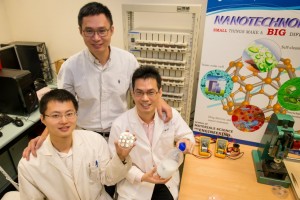Battery breakthrough could lead to ultra-fast charging EVs
by Joanne Ahern • October 13, 2014 • Motoring News
Electric cars could be charged to 70 per cent in just two minutes, if new ultra-fast battery technology developed by scientists in Singapore can be upscaled.
Researchers at Nanyang Technology University (NTU) have developed the new battery by replacing the traditional graphite used for the anode with a new gel material made from titanium dioxide.
This, they say, is commonly used as a food additive or in sunscreen and is ‘an abundant, cheap and safe material found in soil’.
Rechargeable lithium-ion batteries, which are also used in mobile phones and tablets, usually last about 500 recharge cycles – the equivalent of two to three years of typical use.
Each cycle usually takes about two hours for the battery to be fully charged.
However, the NTU-developed technology has a 10,000-cycle life – or 20 years – and can charge to 70 per cent in two minutes, meaning EV drivers could save in both time and battery replacement costs.
Currently, it takes between 30 minutes and nine hours for an EV to charge, depending on the car and the type of charge point used.
The gel was invented by a team led by Associate Professor Chen Xiaodong from NTU’s School of Materials Science and Engineering.
They are currently applying for a Proof-of-Concept grant to build a large-scale battery prototype.
Prof Chen said that the patented technology already has industry interested and he believes it could be in production in as little as two years. However, that timeframe would depend on whether industry licences it.
He added: ‘Electric cars will be able to increase their range dramatically, with just five minutes of charging, which is on par with the time needed to pump petrol for current cars.
‘Equally important, we can now drastically cut down the toxic waste generated by disposed batteries, since our batteries last ten times longer than the current generation of lithium-ion batteries.’
Visit the NTU website or its Facebook page for further details.


